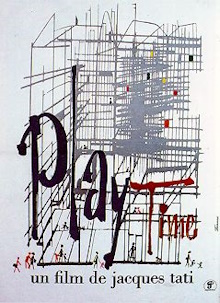Jacques Tati is another of the great names of French cinema but I haven’t seen any of his work before this. PlayTime is considered his masterpiece and it’s so delightful and easy to watch that I wondered why I hadn’t made this a higher priority. There’s no plot and only incidental dialogue, with the real star of the show here being this huge caricature of a futuristic Paris that has been dubbed Tativille. The Monsieur Hulot character, played by Tati himself, reminded me of an extended Mr. Bean skit but of course this draws on older comedians like Charlie Chaplin. This film cost too much to make however and never made the money back. It also took some time before it was properly recognized as a work of genius and that may be why Tati ended up making so few films in his life.
A group of American tourists arrive at the airport and are organized into buses to head into Paris. This is a hyper-modern, almost science-fiction version of the famous city, with every building made of steel and glass and equipped with complex, incomprehensible devices. At one of these buildings, Monsieur Hulot wearing his trademark hat, coat and carrying an umbrella, arrives for an appointment. The doorman struggles to announce him via a complex control panel and the man he is there to see is busy. Soon he gets amidst the maze of rooms, corridors and elevators. He ends up in the nearly identical building next door which is holding a trade exhibition showcasing all kinds of gadgets and modern furnishings. Meanwhile the group of American tourists has arrived nearby and one particular woman among them stands out as she tries to take photographs of a flower seller’s stall outside. By the time night falls, the hapless Hulot is still unable to meet the man he had come to see but his adventures in this strange version of Paris continue.
Despite recurring characters like Hulot, the American woman and such, there is no plot and the dialogue is so unimportant that its volume is deliberately turned down to become just a background murmur. Like a true work of science-fiction, the real character here is this vision of Paris itself. Tati dreamt it up to protest against Charles de Gaulle’s plans to demolish parts of the historical city and put up modern skyscrapers in their place. The entire film consists of six sequences, each set in a different part of this city, with Hulot wandering between them though the focus is never entirely on him. The only signs we see of the old Paris are brief reflections of the Eiffel Tower and Montmartre. At every location, Hulot along with many of the Parisians, are confounded and unsettled by the unnaturalness of the environment to comedic effect. At one point, he is invited into an apartment block which consists of identical glass-fronted units with no curtains at all so we are able to voyeuristically watch the lives of the inhabitants playing out before us. Another scene involves watching a restaurant being built and then immediately receive guests and diners before everything is ready with predictably disastrous consequences.
I wouldn’t exactly call this laugh out loud funny to me but it’s plenty amusing and I loved seeing the ideas that Tati keeps throwing out. True to the form, even if there is no plot, there is still an overall emotional arc. Over the course of the day and night shown in the film, the characters get inebriated, things fall apart, chaos creeps into the orderly city and it’s all for the better as color and joy return to their lives. As one critic so memorably put it, this is the story of a straight line slowly transforming into a curve. It’s a triumph of imagination and sheer will as building that fake city from scratch must have been truly daunting. Interestingly, I also noted that there is no cruelty or malevolence at all in the film. It never portrays any character as being to blame for the state of the city and never allows anyone to get too seriously hurt despite the many blunders and accidents that happen. Tati really just wanted to show how awful it would be to live in a city that is made of steel and glass and where everything aspect of life proceeds according to regimented rules.
I do think the film has some issues. The original cut was 140 minutes but even this 120 minutes version that I watched was probably a little too long. The sequence set in the restaurant is to blame as it is much longer than the ones and there isn’t enough of a payoff to justify that running time. Then there’s how Hulot keeps running into people from know him from the war but I don’t really understand what that’s about. Perhaps it’s a reference to Tati’s earlier films. Anyway I certainly will watch them at some point. It’s a terrible shame that the commercial failure of this film seems to have broken Tati as it is indeed a masterpiece.
